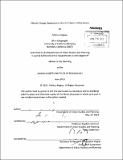Climate change adaptation in the U.S. electric utility sector
Author(s)
Higbee, Melissa (Melissa Aura)
DownloadFull printable version (7.994Mb)
Alternative title
Climate change adaptation in the United States electric utility sector
Other Contributors
Massachusetts Institute of Technology. Department of Urban Studies and Planning.
Advisor
Stephen Hammer.
Terms of use
Metadata
Show full item recordAbstract
The electric utility sector has been a focus of policy efforts to reduce greenhouse gas emissions, but even if these efforts are successful, the sector will need to adapt to the impacts of climate change. These are likely to include increased heat waves, drought, extreme precipitation events, and sea level rise. Electric utilities play a key role in providing electricity services in cities that will be facing all of these difficulties. Cities depend on electricity service for public health, safety and economic development. This thesis examines how electric utilities in the United States are approaching climate change adaptation and the factors enabling and constraining these efforts. The thesis draws on an analysis of electric utility responses to surveys distributed by the Carbon Disclosure Project as well as case studies of Consolidated Edison, Entergy, and Pacific Gas & Electric. The case study utilities are incorporating climate change projections into their risk management and capital planning activities. Integrating climate change projections into risk management efforts helps utilities use replacement opportunities to build greater resilience into infrastructure systems and ensure that adaptation strategies take competing demands on resources into account. Both approaches to adaptation are generally recommended by adaptation experts. However, existing internal decisionmaking may not be well suited for incorporating the uncertainties of climate change impacts. The case study utilities could be using Scenario Planning to develop strategies likely to be effective given a range of possible futures, but they are not. I argue that state utility regulatory commissions should consider taking a more active role in providing guidance and oversight to utilities regarding climate change adaptation. They should consider (1) requiring utilities to submit climate change vulnerability assessments and detailed adaptation plans; (2) incorporating climate change risk and adaptation considerations into existing electricity plans; and (3) convening joint climate change planning efforts with utilities, municipal governments, and a range of other stakeholders. Cities and states that would like to see electric utilities put more emphasis on climate change adaptation should consider sharing climate change projections and forecasts of potential climate change impacts. Provision of such information has been effective in encouraging adaptation planning in the case studies. The actual adaptation strategies that utilities have adopted depend largely on the risks they face and the regulatory and policy environment in which they find themselves.
Description
Thesis (M.C.P.)--Massachusetts Institute of Technology, Dept. of Urban Studies and Planning, 2013. Cataloged from PDF version of thesis. Includes bibliographical references (p. 95-101).
Date issued
2013Department
Massachusetts Institute of Technology. Department of Urban Studies and PlanningPublisher
Massachusetts Institute of Technology
Keywords
Urban Studies and Planning.